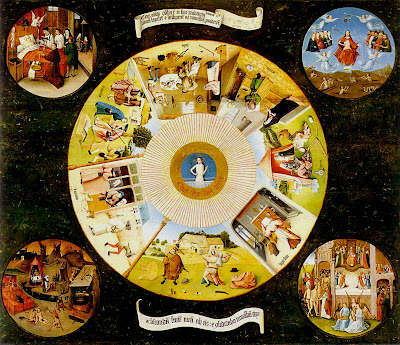
The Church has added to the list of mortal sins:
Environmental pollution
Genetic manipulation
Accumulating excessive wealth
Inflicting poverty
Drug trafficking and consumption
Morally debatable experiments
Violation of fundamental rights of human nature
*
These seven new deadly sins will no doubt raise concern in the Catholic laity. But what is sin anyway? Here are a few selections from the Catechism of the Catholic Church.
1855 Mortal sin destroys charity in the heart of man by a grave violation of God's law; it turns man away from God, who is his ultimate end and his beatitude, by preferring an inferior good to him. Venial sin allows charity to subsist, even though it offends and wounds it.
1857 For sin to be mortal, three conditions must together be met: "Mortal sin is sin whose object is grave matter and which is also committed with full knowledge and deliberate consent."
1858 Grave matter is specific by the Ten Commandments, corresponding to the answer of Jesus to the rich young man: "Do not kill, Do not commit adultery, Do not steal, Do not bear false witness, Do not defraud, Honor your father and mother." The gravity of sins is more or less great: murder is graver than theft. One must also take into account who is wronged: violence against parents is in itself graver than violence against a stranger.
1859 Mortal sin requires full knowledge and complete consent. It presupposes knowledge of the sinful character of the act, of its opposition to God's law. It also implied a consent sufficiently deliberate to be a personal choice. Feigned ignorance and hardness of heart do not diminish, but rather increase, the voluntary character of a sin.
1860 Unintentional ignorance can diminish or even remove imputability of a grave offense. But no one is deemed to be ignorant of the principles of the moral law, which are written in the conscience of every man. The promptings of feelings and passions can also diminish the voluntary and free character of the offense, as can external pressures or pathological disorders. Sin committed through malice, by deliberate choice of evil, is the gravest.
1861 Mortal sin is a radical possibility of human freedom, as is love itself. It results in the loss of charity and the privation of sanctifying grace. If it is not redeemed by repentance and God's forgiveness, it causes exclusion from Christ's kingdom and the eternal death of hell, for our freedom has the power to make choices for ever, with no turning back. However, although we can judge that an act is in itself a grave offense, we must entrust the judgment of persons to the justice and mercy of God.
1033 We cannot be united with God unless we freely choose to love him. But we cannot love God if we sin gravely against him....Our Lord warns us that we shall be separated from him if we fail to meet the serious needs of the poor and the little ones who are his brethren. To die in mortal sin without repenting and accepting God's merciful love means remaining separated from him for ever by our own free choice. This state of definitive self-exclusion from communion with God and the blessed is called "hell."
*
It appears that these new mortal sins, if committed with full knowledge and complete consent and lacking repentance, will land the sinner in the hot place. Lesser sins can be purged by the fires of Purgatory.
1030 All who die in God's grace and friendship, but still imperfectly purified, are indeed assured of their eternal salvation; but after death they undergo purification, so as to achieve the holiness necessary to enter the joy of heaven.
1031 The Church gives the name Purgatory to this final purification of the elect, which is entirely different from the punishment of the damned. The Church formulated her doctrine of faith on Purgatory especially at the Councils of Florence and Trent. The tradition of the Church, be reference to certain texts of the Scripture, speaks of a cleansing fire.
Prior to the codification of this doctrine, various medieval writers weighed in on those sins which required purification in the fires of Purgatory. For example, an anonymous 7th century writer in Ireland specified that those who commit these "not very harmful" sins would be baptized by fire: "the idle use of legitimate marriage, overindulgence in eating, taking excessive pleasure in useless things, anger leading to abusive language, exaggerated interest in personal affairs, inattentiveness during prayers, late sleeping, undue bursts of laughter, overindulgence in sleep, holding back the truth, gossiping, sticking stubbornly to error, holding the false to be true in matters not involving faith, neglect of duty, and disorderly attire."*
*
In the spirit of this 7th century monk, I propose two more sinful acts that require purification.
The gratuitous appropriation of Arendt in lightweight scholarship
The use of the words experience or agency in polite company
_________________________________________________
* Jacques Le Goff, The Birth of Purgatory (Chicago: University of Chicago Press, 1984), 100.
art object credit: Hieronymus Bosch, The Seven Deadly Sins and the Four Last Things, 1485
1 comment:
hahaha I like your additions, especially the Arendt one
Post a Comment